Industrial electrical contractors play a pivotal role in the design, construction, and upkeep of industrial electrical systems. Adapting to technological advancements while adhering to technical and legal standards is crucial. This article delves into key aspects of industrial electrical contractors.
The Role of Electrical Contractors in Industrial Parks
Contractors are tasked with designing and implementing electrical systems that ensure safe and stable operations within industrial zones. Adhering to stringent industrial electrical standards helps mitigate risks in production and operational phases.
Contractors are crucial in industrial zones by designing and executing plans for electrical systems, thereby enhancing production efficiency and safety. Compliance with rigorous industrial electrical safety standards ensures systems are installed with minimal risk.
- Designing and Executing Electrical Systems: Contractors are responsible for planning and implementing electrical systems, including wiring, switchboards, transformers, and other equipment, leveraging technology from major brands like ABB, Schneider, and Mitsubishi.
- Ensuring Safety and Efficiency: Their role transcends mere construction. They ensure optimal operational efficiency through adherence to industrial electrical safety standards, limiting risks of power shorts and related accidents.
- Cost and Schedule Optimization: Efficient cost management is integral to their work, selecting optimal materials and equipment to avoid waste and keep projects on schedule.
- Technology Development and Upgrade: Staying ahead of new electrical innovations is key, continuously optimizing systems to meet increasing industrial energy demands.
- Maintenance and Repair: Regular maintenance and prompt repair services ensure system reliability, minimizing factory downtime.
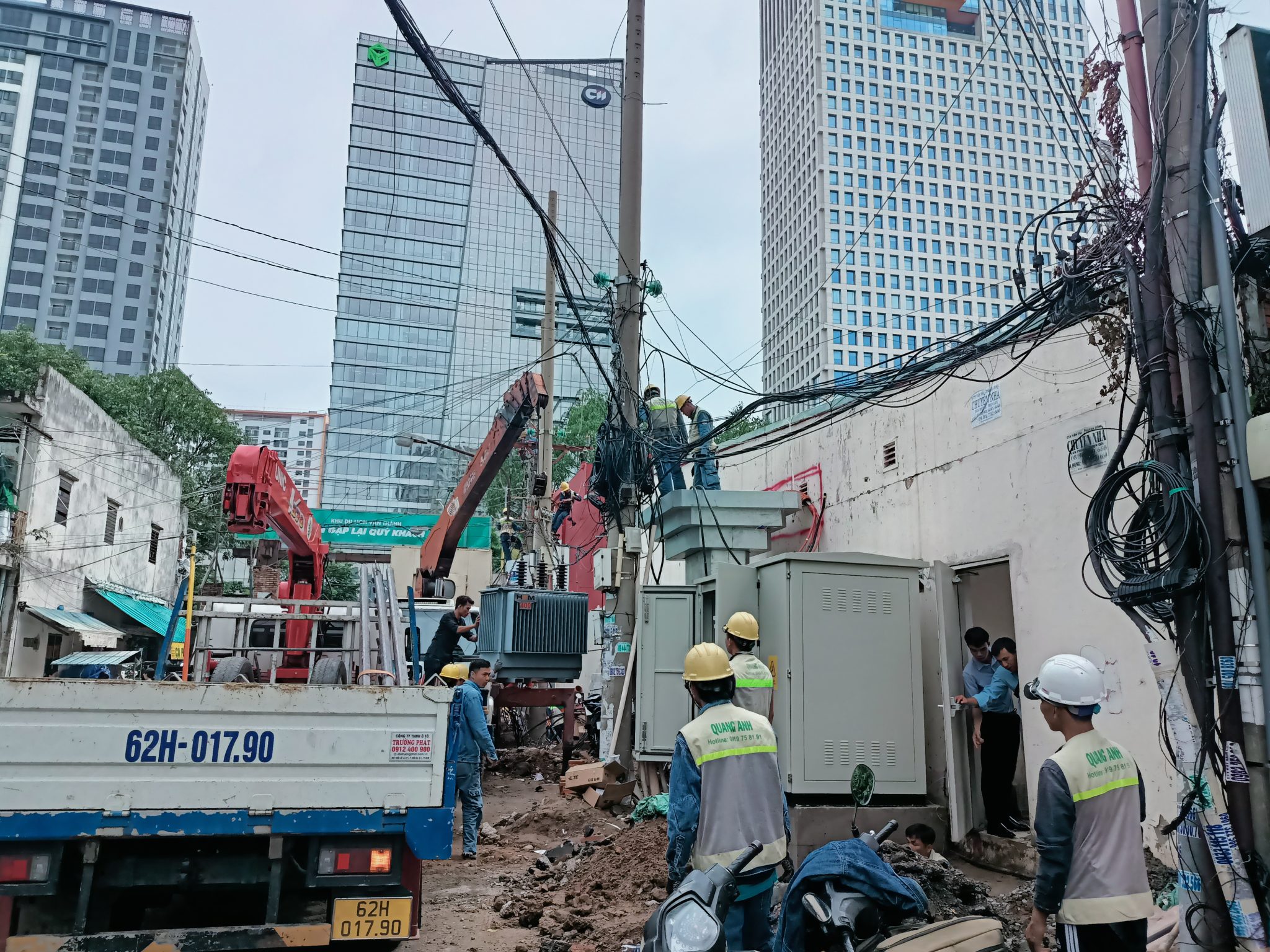
Electrical System Installation in Industrial Parks
Installing electrical systems in industrial settings demands precision and caution. Every phase, from detailed designing through execution, must adhere to safety and performance standards.
The process necessitates thorough preparation and detailed execution to ensure maximum safety and operational efficacy, detailed through critical steps:
- Equipment Preparation and Site Survey
- Prepare complete necessary equipment, using materials from reputable brands like ABB, Mitsubishi, Schneider, and LS, ensuring quality during electrical installation.
- Conduct detailed site surveys to align project requirements with realities, enabling strategic electrical system implementation.
- Electrical System Design
- Create detailed electrical system designs with comprehensive schematics to illustrate the projected system structure and layout.
- Installation Execution
- Conduct industrial electrical installations per approved schematics, adhering to technical and safety standards at every step.
- Inspection and Testing
- Test systems rigorously to ensure stability before transferring ownership.
- Receive client feedback post-completion for systematic closure.
- Installation Considerations
- Prioritize worker and equipment safety, ensuring optimized operational and energy use costs.
- Strict compliance with industrial electrical installation standards is critical.
- Standards and Legislation
- Maintain compliance with technical and safety regulations; systems require authoritative approval.
- Management and Maintenance
- Effective industry electrical management sustains continuous operation sustainability.
- Routine industrial electrical maintenance ensures optimal performance longevity.
System installation hinges on seamless integration across phases, from equipment setup and design through execution and ongoing maintenance, ensuring efficient, safe system operations.
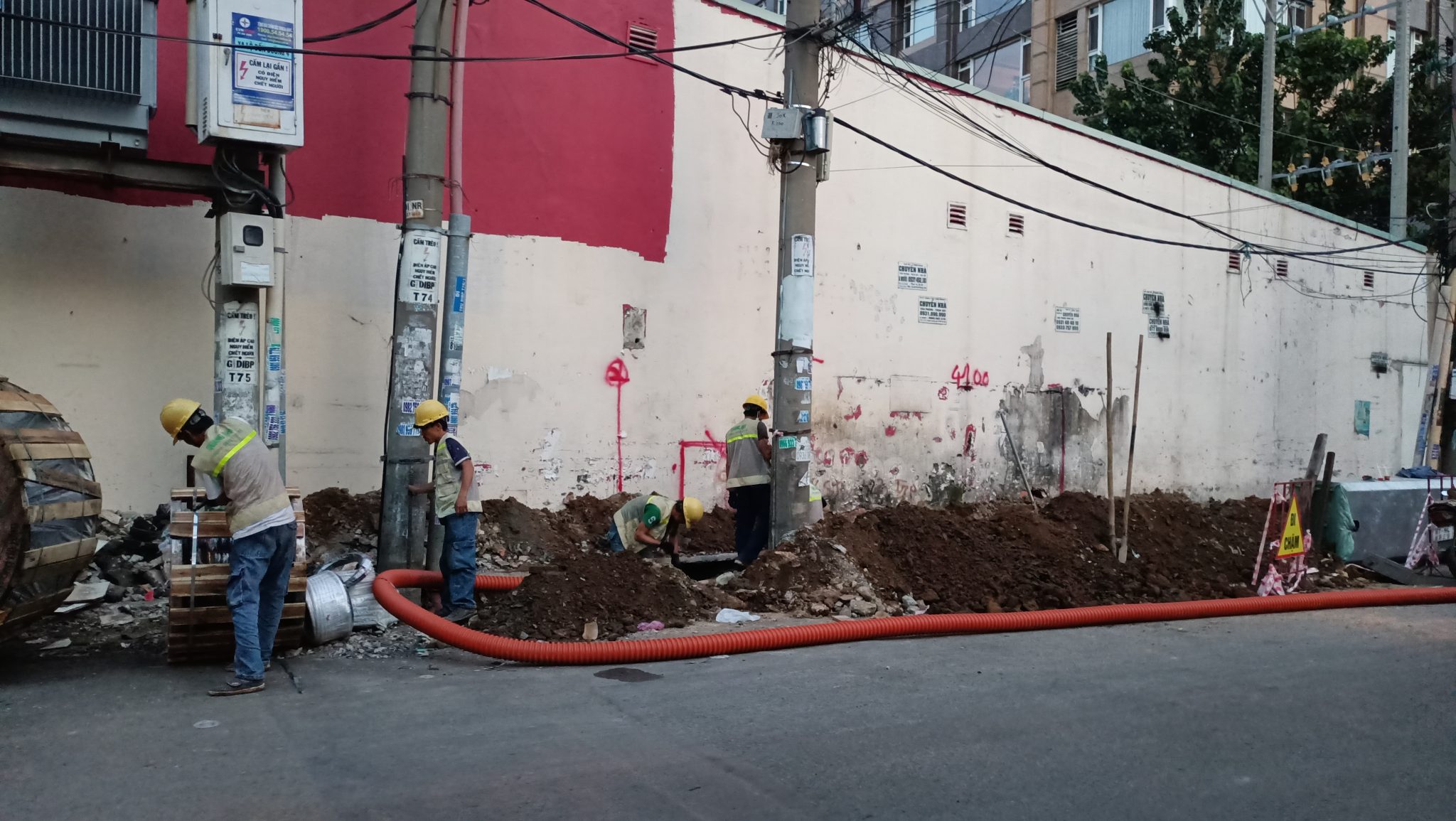
Management and Maintenance of Industrial Electrical Systems
Effective management and maintenance of industrial electrical systems are vital for consistent operation. Contractors must have strategic maintenance schedules and skilled teams for rapid incident response, ensuring maximum operational safety.
Managing and maintaining industrial electrical systems are cornerstones of performance and safety within an industrial environment. For business leaders and engineers, this process extends beyond necessity, forming an indispensable element for achieving optimal outcomes.
Purpose of Industrial Electrical Maintenance
Maintaining electrical equipment in an industrial setting fulfills three primary aims:
- Optimizing System Performance: Regular maintenance enhances the operation of equipment like generators and converters, ensuring product quality and efficiency, crucial for competitive production environments.
- Ensuring Industrial Electrical Safety: Well-maintained systems promptly identify and rectify issues, minimizing potential mishaps and safeguarding personnel and infrastructure.
- Cost Reduction: Scheduled maintenance addresses issues before they escalate, avoiding major repair expenses and extending equipment lifespan.
Process of Industrial Electrical System Maintenance
Industrial electrical system maintenance encompasses these critical steps:
- Preparation: Equip protective gear and tools, securing the maintenance area to uphold safety.
- Inspection and Analysis: Conduct comprehensive system evaluations to identify faults, such as leaks, and diagnose failure causes.
- Perform Maintenance: Execute cleaning, repairs, and component replacements, aligning with safety standards.
- Safety Testing and Recording: Conduct necessary tests, documenting maintenance procedures to facilitate rapid recovery.
- Training and Skill Development: Ensure continual training and knowledge updates for staff.
Maintenance Management
Efficient maintenance management requires clear planning and scheduling, ensuring tasks are timely executed for optimal system performance.
Standards and Regulations
Adhering to crucial standards like TCVN 8241-4-2, IEC 61000-4-2, TCVN 5699-1:2010 is vital during maintenance, ensuring the system operates safely and at the highest quality.
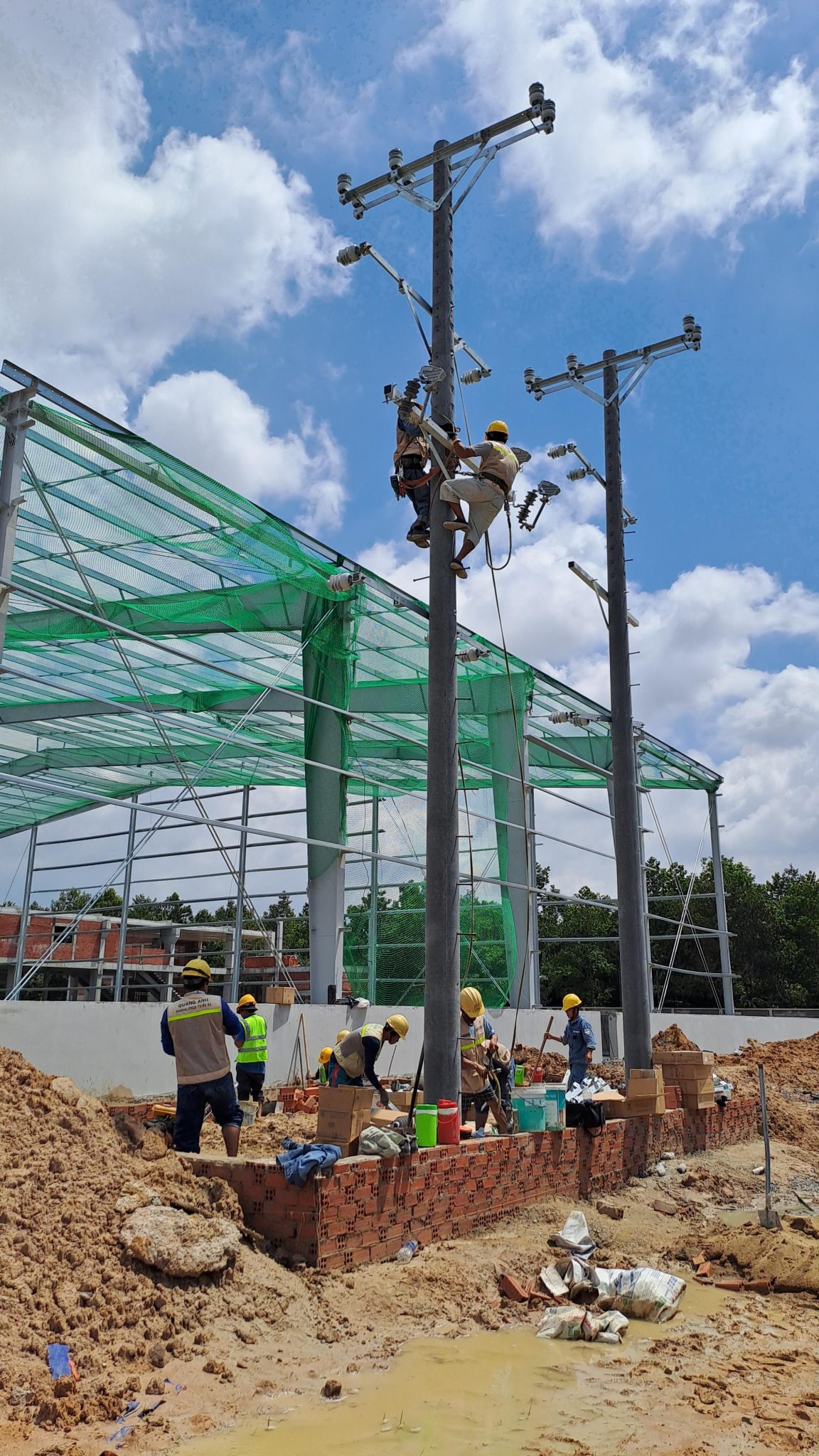
Technical Standards and Legal Compliance in Industrial Electrical Works
Conformity to technical standards and legal regulations is critical in electrical construction. Continuous updates on new regulations guarantee systems are both efficient and compliant.
Industrial electrical works in Vietnam are bound by numerous electrical standards and legal frameworks. National (TCVN) standards and technical regulations (QCVN) are pivotal in regulating the quality and safety of electrical installations.
National Standards (TCVN)
Adhering to TCVN standards is essential for safety and quality:
- TCVN 9206:2012 stipulates requirements for installing electrical equipment in establishments, promoting safety and efficacy.
- TCVN 9208:2012 details technical requirements for cable installations up to 24 kV, ensuring stability and safe operations within systems.
- TCVN 6454-1:1997 and TCVN 6454-2/3:1997 specify safety, environmental hygiene, and technical guidelines for choosing and installing electrical devices, wires, and cables.
Technical Regulations (QCVN)
In constructing and executing electrical projects, QCVN QTĐ 7:2009/BCT serves as a crucial technical regulation, encompassing necessary rules and guidelines for design and installation.
Legal Framework and Certifications
To operate legally and effectively, contractors must hold a business license and electrical construction capability certification. These not only fulfill legal prerequisites but also prove the contractor’s capacity and credibility.
Safety Requirements and Technical Team
Safety in industrial electrical work is non-negotiable. Basic precautions include equipment checks and personal protective equipment, ensuring zero accidents. A technically proficient and experienced team is indispensable for compliance with electrical and legal standards.
Strict adherence to technical and regulatory standards assures contractors and construction teams that electrical installations are safe and efficient.
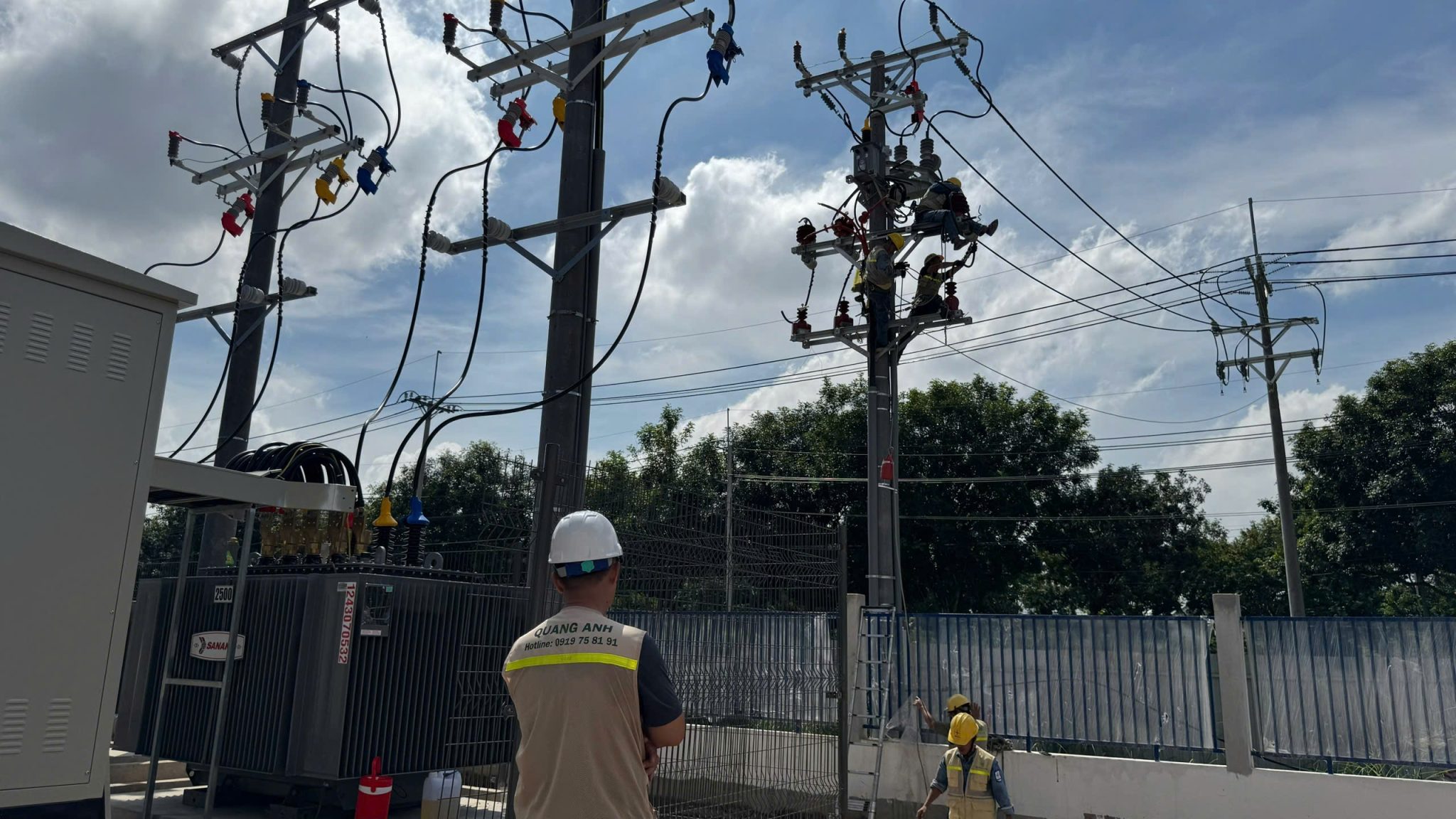
Emerging Technological Trends in Industrial Electricals
Industrial electrical technology is rapidly evolving, with new trends like automation and renewable energy adoption. Contractors must integrate these to maximize efficiency and cost savings.
Amid rising energy demands, the sector faces dynamic developments, ushering in notable 2025 trends.
A key focus is nuclear energy, where advanced reactor technologies and waste management improvements provide clean, steady energy, especially for data centers and AI systems, facilitating larger projects’ renewable integration.
Additionally, solar power technology sees breakthroughs with high-efficiency panels using advanced materials like hybrid perovskites and improved silicon, boosting performance and cutting production and installation costs, fostering global sustainability shifts.
Smart grids also play a pivotal role. Sensor advancements, IoT technology, and connectable devices are transforming our electrical grid management. These systems yield real-time performance insights, streamline maintenance management, and elevate service quality.
The rise of AI energy management emphasizes AI capability to process data and autonomously execute decisions and tasks, minimizing human intervention in energy management, and enhancing reliability and operating efficiency.
Lastly, sustainable technology targets core climate change issues. Enhancing energy efficiency through recycling, alternative technology development, and policy interventions is essential for mitigating impacts and securing future energy stability.
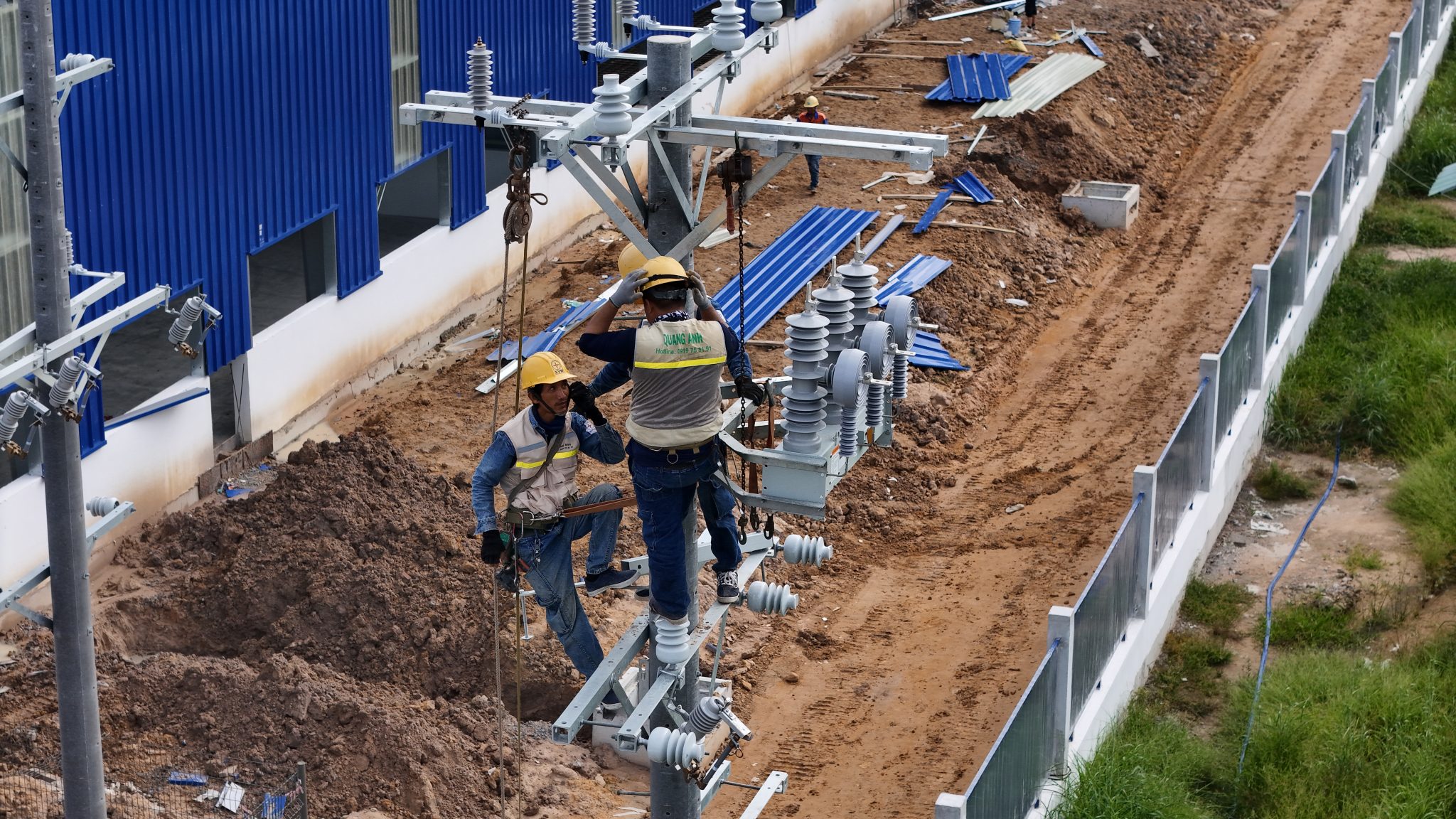
Industrial electrical contractors are indispensable in ensuring smooth system operations and form the cornerstone of a company’s sustainable growth strategy. Mastery of standards, effective maintenance management, and technological innovation are keys to optimizing performance and investment.
Contact QuangAnhcons via Hotline: +84 9 1975 8191 for advice and support on efficient industrial electrical solutions.
QuangAnhcons is dedicated to providing premium-quality design, construction, and electrical maintenance services that ensure stable and sustainable industrial park operations.
[contact-form-7 id="7239967" title="Contact form 1"]

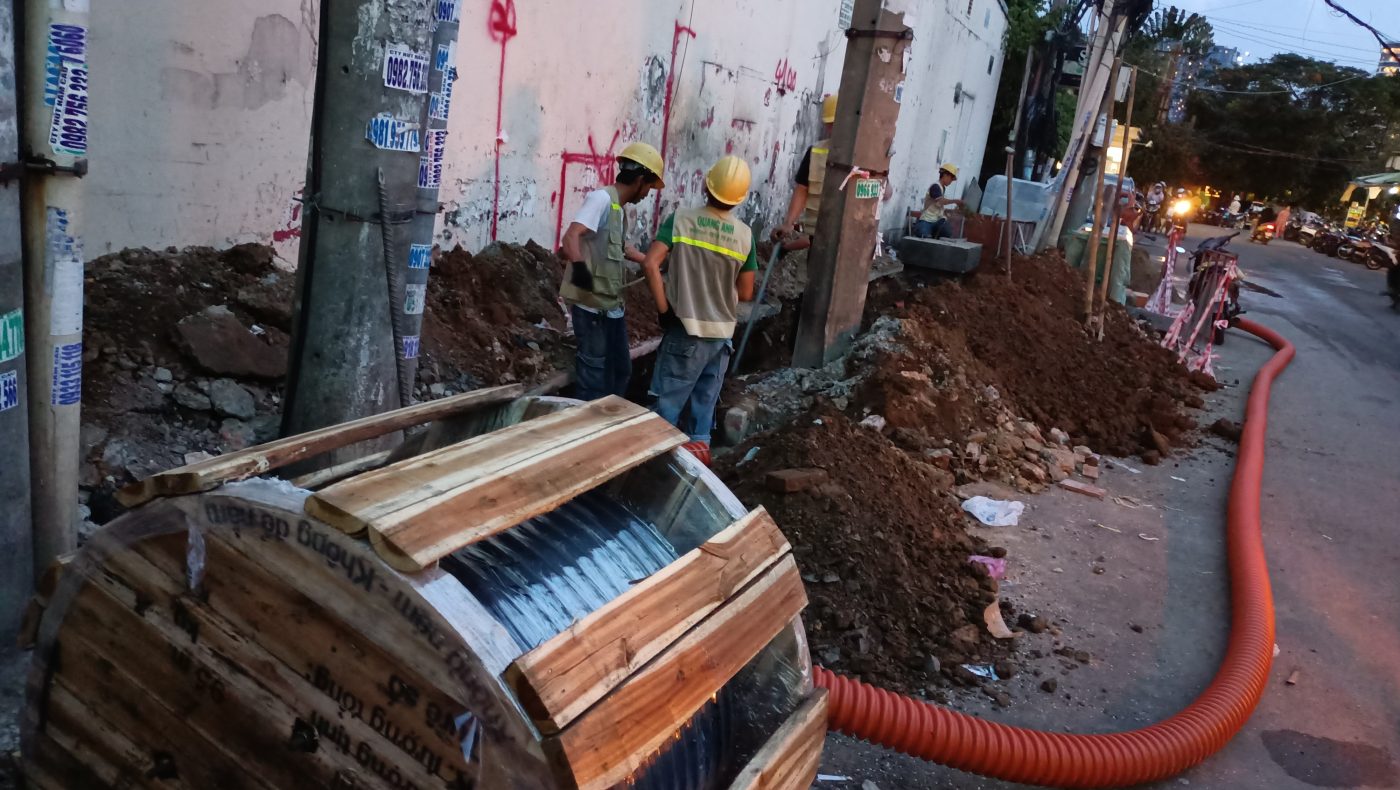
Related Posts
Tay Ninh Solar Power Planning: Technical Framework, Grid Interconnection, and Rollout Roadmap
Technical overview of solar planning in Tay Ninh: irradiation, grid capacity, permitting, design, operations, and [...]
Dec
Binh Duong Solar Planning: Regulatory Framework, Grid Interconnection, and an Implementation Roadmap for Factories and Industrial Parks
An overview of Binh Duong solar planning: legal framework, interconnection, design, risk management, and an [...]
Dec
Solar Farm Repair: O&M Workflow, IV Curve Diagnostics, Thermography, Inverter Service and Utility-Scale Safety
A utility-scale solar farm repair plan centered on O&M, IV curves, thermal imaging, inverter service, [...]
Dec
Dong Nai Solar Power Plan 2023–2025: Tri An 1,029 MW, Grid Upgrades and the DPPA Pathway
A complete look at Dong Nai’s solar power plan: Tri An 1,029 MW, irradiation potential, [...]
Nov
Quang Ngai Solar Power Plan 2024–2030: Legal Framework, Irradiance Potential, and Development Roadmap
A complete look at Quang Ngai’s solar power plan: capacity targets, irradiance (PVout), development zones, [...]
Nov
Solar Damage Assessment Services: On-Site Procedures, EL/IV/Thermography Testing & Compliance with Standards
Discover IEC/UL/NEC standard solar damage assessment processes: on-site evaluation, EL and IV curve testing, thermal [...]
Nov
Comprehensive Package Estimate for a 1800MVA 500kV Substation: Scope, Configuration 3x600MVA, Standards and Timeline Management
An overview of the 1800MVA 500kV substation estimate: construction scope, configuration 3x600MVA, GIS/AIS, SCADA, standards, [...]
Nov
Factory Electrical Systems: Comprehensive Design and Implementation Guide
Discover the detailed and safe process of factory electrical systems design and implementation. [...]
Oct
Blueprints Required for Factory Construction Permits
Discover the necessary blueprints in factory construction permit applications, from floor plans to electrical and [...]
Oct
What Are the Requirements for a Factory Construction Permit? A Comprehensive Guide
Explore the documentation and steps needed to secure a factory construction permit for streamlined project [...]
Oct
Factory Construction Permit Procedures in Vietnam: Essential Guidelines and Documents
Learn the procedures for securing a factory construction permit in Vietnam, focusing on document preparation [...]
Oct
Key Steps in the Factory Construction Process
Discover the essential steps and requirements for building factories. [...]
Oct
Comprehensive Electrical Substation Solutions by Quanganhcons
Discover the cutting-edge electrical substation solutions offered by Quanganhcons for industrial applications. [...]
Oct
Investment Costs for a 1MWp Solar Power System and Influencing Factors
Explore the investment costs for a 1MWp solar power system in Vietnam and the influencing [...]
Sep
QuangAnhcons: Elevating Wind Energy Solutions
Explore QuangAnhcons' leadership in wind energy and renewable solutions in Vietnam. [...]
Sep
Electrical Contractor Strategies at Becamex Industrial Park
Discover the strategic advancements and partnerships of the electrical contractor at Becamex Industrial Park. [...]
Sep
Investment Insights for 1MW Wind Energy in Vietnam: Costs and Opportunities
Discover the detailed analysis of costs and opportunities for investing in 1MW wind energy projects [...]
Sep
Advanced Electrical Installation Solutions by QuangAnhcons
Explore advanced electrical installation solutions and modern technology with QuangAnhcons. [...]
Sep
Enhancing Industrial Electrical Services with Quanganhcons
Discover Quanganhcons' expertise in industrial electrical services, offering efficient and sustainable power systems. [...]
Sep
Comprehensive MEP Solutions by QuangAnhcons: From Design to Maintenance Excellence
Discover optimal MEP solutions with QuangAnhcons, dedicated to excellence from design through maintenance. [...]
Sep